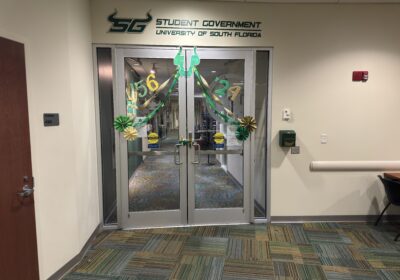International students face challenges of studying from home amid COVID-19

With USF offering mostly online and hybrid style classes this semester, many students have stayed home to complete their courses, even if home is outside of the U.S.
From getting used to a different time zone to even reconfiguring their sleep schedule to attend live sessions, some international students have been juggling their classes with their daily routine while thousands of miles away from campus, especially with synchronous sessions following the Eastern Standard Time Zone (EST).
Ameer Khawaja, a junior majoring in civil engineering, has left the U.S. to be with his family in Lahore, Pakistan, which is nine hours ahead of EST.
“All my classes start at 8 p.m. and they go until almost 2 a.m.,” Khawaja said. “My online lab starts at 5 p.m. EST, so 2 a.m. here every Monday, so Monday is quite a long day since I have four classes from 8 p.m. to 3 a.m., but it is bearable.”
In total, Khawaja said he is taking 13 credit hours this semester and has not found the time zone difference to be overly challenging.
“It’s honestly been convenient because since I am a night owl I can easily study for my classes during the day and take my classes at night,” he said.
Professors have been considerate of his situation, Khawaja said.
“[The professors] have said themselves that since many students are in different time zones and might find it hard to work together as a group, they’ll push back assignments at times in case some students are having problems,” he said.
Althea Paul, the media relations manager for USF, said that guidelines have been put in place to assist professors and help international students face and overcome the challenges that time zones may present.
“Faculty are being encouraged to gather information and to accommodate students with assignment due dates, along with the timing of synchronous sessions and exams, which will allow students to succeed academically, no matter where they are,” Paul said.
Although Khawaja said he has had considerate professors, others claim to not have the same experience.
Richa Kakar, a sophomore majoring in computer science, has stayed with her family in Mumbai, India, for the fall semester, and said she hasn’t found the professor’s response to online schooling to be as helpful as she would like.
“In my opinion, I feel the professors aren’t being the most considerate in terms of grades and testing,” Kakar said. “I mean, it’s a pandemic for all of us. I expected a little leniency from professors considering not everyone right now has the best mental health and it is not easy to perform if you are not emotionally feeling strong.”
However, she has one class she said provides leniency.
“My math professor is kind enough to let us miss lectures and see the recordings later if we aren’t able to stay up until 4 in the morning, but other than that things are pretty normal,” she said.
At 2:30 a.m. is when Kakar said she has to attend classes and finds that studying at that time has not been the easiest adjustment.
“There is a good 9 1/2-hour time difference between the U.S. and India, so having class late at night and early morning definitely messed up my schedule, and I think it has slightly reduced my efficiency,” she said.
Khawaja and Kakar are not the only ones who have to synchronously attend their classes at obscure times. Saad Aftab, a sophomore majoring in finance who is currently taking his online classes in Pakistan, must also attend class late at night.
“The biggest challenge for me has been the timings of synchronous class,” Aftab said. “I have a three-hour accounting class which happens to occur between 3:30 a.m. to 6:30 a.m. in my time zone, so it has definitely taken some getting used to.”
Like Khawaja, Aftab said he has had a good experience with his professors this semester. Also, a professor even helped him sort out an issue that arose with a book delivery from the bookstore, according to Aftab.
“They’ve been fantastic in my opinion,” Aftab said. “You do have to feel for them just as much you would feel for a student. They’re thrust into this unknown environment where they have to make sure we’re attended to and I have nothing but the uttermost respect for all my professors.”
Another student who is living in India this semester is Anshika Bhowmick, a sophomore majoring in computer science. She said that the time difference has presented a challenge for her to speak with her professors.
“The time difference has been difficult to cope with,” Bhowmick said. “A lot of times, I miss office hours due to this, and later have to get my doubts clarified through emails, which isn’t as effective, but I cannot do anything.”
The same issue arises with deadlines for assignments.
“Deadlines are the same for me as they are for students in the U.S.,” Bhowmick said. “It is my duty to keep track of them in my calendar to ensure I don’t miss out on any, which is a huge task.”
As laid out in the guidelines given to professors concerning this issue, deadlines must be made clear to students in the syllabus.
“You will want to ascertain at the beginning of the semester the time zones associated with your students — especially if your class includes international students who may be enrolled online from their home countries,” according to the guidelines. “Students will need clear guidance that the dates and times listed in the syllabus and articulated in class, regarding assignment due dates, testing times, synchronous sessions and other activities that are time-sensitive, refer to EST.”
Students are being asked to inform professors of any problems that different time zones are presenting for them and for any other difficulties, there are other ways for international students to reach out for help, according to Paul.
“If a student is experiencing any difficulty managing a time zone difference, please contact USF World or USF Dean of Students Office for assistance and support,” she said.
Not all students who are taking their online courses abroad are running into time zone issues.
Roxanna Masso, a junior majoring in biomedical sciences who is living in San Juan, Puerto Rico, has been virtually taking classes on the island since the Summer B semester.
Masso said the transition has gone well and she has flexible professors, only two of whom require synchronous class.
San Juan is in Atlantic Standard Time, which is the same as EST, according to Masso.
“Schedules and times haven’t been an obstacle for me,” Masso said. “As of now, there are no major challenges from doing online school in Puerto Rico.”
Time zones are not the only issue these students may face, but their own living environment may present difficulties that a student may not face if they were on campus.
For some, internet connection and access may be limited.
“The normal internet here isn’t as fast and reliable as in the U.S.,” Bhowmick said. “I have to pay a good amount every month to get unlimited internet supply at a good speed so that I can attend my classes and take the tests.”
Being off campus and fully virtual has made some feel as though they are not going to perform as well as in the past.
“Due to the lack of in-person interaction, I feel I’m not going to do as well as I did in previous semesters,” Bhowmick said. “Staying motivated during these times is tougher than I expected it to be.”
The ups and downs of the fall 2020 semester have brought new challenges for students and professors to conquer together, especially for students taking their virtual courses abroad.
“It’s a semester that we can all use to really dig deep and learn more about overcoming adversity and the unexpected challenges posed as a result of the pandemic,” Aftab said.






